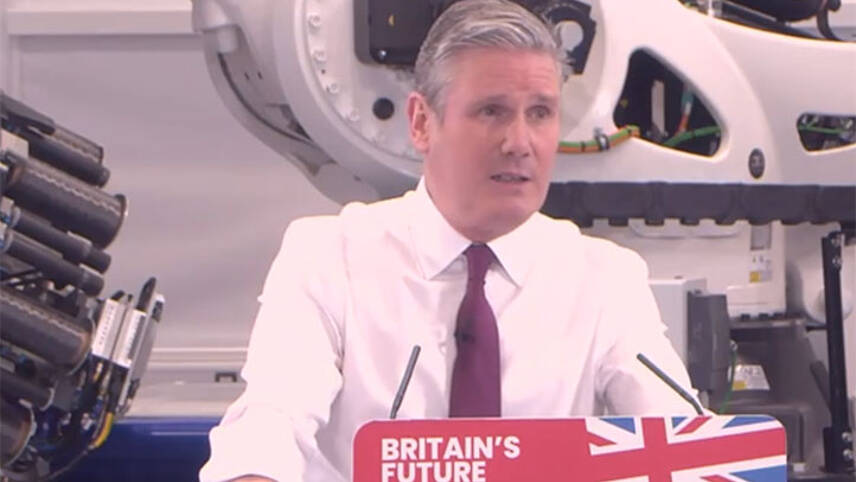Register for free and continue reading
Join our growing army of changemakers and get unlimited access to our premium content

Keir Starmer conveyed that there will be no additional investment commitments before the election.
Starmer delivered a New Year speech to a selection of national journalists in Bristol on Thursday (4 January), stating that if Labour were to win a General Election later this year, his party would build a “Britain standing tall again, looking forward again, believing again, that tomorrow will be better for your children”.
The Labour leader’s speech covered “five national missions that will sweep away the era of Tory division”, one of which was clean energy and security.
“What the Tories have done to our public realm over the last 14 years, not just the cuts, also the denigration of the people who serve this country, the total lack of respect, honestly there are no words,” Starmer said.
“But I also have to say this, I don’t see our job as going back to some kind of golden age, I don’t think that’s how working people look at things at all. Government in this country is too centralised and controlling, and because of that, too disconnected from the communities it needs to serve.
“We have got to change this. It is vital for taking on the profound challenges of our era: the rising geopolitical temperature, climate change, terrorism, securing our borders, the revolutions in science, energy, technology that are reshaping everything we know about our world.”
Watch Live: Keir Starmer https://t.co/YMhQwKANbv
— Keir Starmer (@Keir_Starmer) January 4, 2024
Following his speech, the Labour leader was quizzed by national journalists on topics ranging from immigration to darts.
During the media Q&A, (at around 55 minutes in the video) GB News asked how Labour would go about funding a £28bn green financing pledge. The pledge was made back in 2021 and has since been pushed back in terms of timescales.
Starmer, however, reiterated that the mission was to achieve “clean power by 2030” and that the Party was “determined to achieve it”.
He stated that a clean power revolution would lower energy bills and boost energy security so that “Putin can’t put his foot on our throat”, while also spurring new job growth.
Starmer dismissed concerns that the pushback on timeframes for the commitment was a signal that Labour was not sure of how it could generate the funding.
“This attack is misconceived,” Starmer told journalists. “Frankly, most people understand the argument that you have to invest in the future. And that’s what we’ll do. It’s the lack of investment, the lack of long-term thinking that has put us in this position now.
“We’re more exposed on the international market when it comes to energy than many other nations because the Government never took long-term decisions. I’m not prepared for an incoming Labour Government to make the same mistakes.
“There is no question of pushing back on the mission. This mission is clean power by 2030. No one is pushing back on that. We’ve looked very carefully at the investment. The investment we want to put in is designed to trigger private investment at a ratio of 1:3. We’ve had extensive discussions with global investors as to how that works. Just because we pushed back the ramping up to £28bn, it doesn’t mean there’s nothing before that. Subject to our fiscal rules, but that’s just sensible investment.”
Incoming Election
Starmer’s speech will be the first of many as the two parties ready for a general election, with the Conservatives struggling to overcome a deficit in the polls.
The green agenda, which has become politicised as of late, will be one of the key topics of this General Election, as the nation tries to build toward a net-zero goal for 2050.
Environmental NGOs such as WWF and Friends of the Earth have previously praised Starmer for recognising how a well-managed transition to net-zero would contribute to Britain’s ambitions for economic growth and levelling up.
Last year, Starmer was quick to criticise the Conservatives for various rollbacks on key energy-related legislation frameworks. These included a five-year delay on the ban of new petrol and diesel cars and vans, to 2035; a weakening of requirements for all homes with oil and gas boilers to replace them with low-carbon alternatives and weakened requirements for landlords to improve building energy efficiency.
Sunak said he took these measures to reduce upfront costs for households now; Starmer countered that this will simply pass costs and risks on to the next generation. Starmer stated that the global energy price crisis was affecting Britain acutely due to past failures to invest in renewables, insulation and gas storage.
At the the Labour Party Conference in October, the Party pledged the creation of a new ‘Energy Independence Act’ to reduce the UK’s dependence on imported fossil fuels – and also to scale up clean energy supply chains in Britain.
The Act would set in motion the creation of a public energy company, GB Energy. It would include stronger targets to rapidly scale renewable energy capacity, to support a target to phase out unabated gas-fired electricity generation by 2030. This is five years sooner than the Conservatives’ current target.
Targets would include doubling onshore wind, trebling solar and quadrupling offshore wind – all by 2030, against current levels. Labour would also retain or enhance existing commitments on nuclear, hydrogen, tidal power and carbon capture.


Please login or Register to leave a comment.